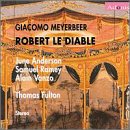| All Artists: Giacomo Meyerbeer, June Anderson, Samuel Ramey, Alain Vanzo, Michele Lagrange, Walter Donati, Opéra National de Paris Title: Meyerbeer: Robert le Diable Members Wishing: 0 Total Copies: 0 Label: Adonis Release Date: 3/15/2000 Genre: Classical Style: Opera & Classical Vocal Number of Discs: 3 SwapaCD Credits: 3 UPCs: 675754155728, 7640104100034 |
Search - Giacomo Meyerbeer, June Anderson, Samuel Ramey :: Meyerbeer: Robert le Diable
 | Giacomo Meyerbeer, June Anderson, Samuel Ramey Meyerbeer: Robert le Diable Genre: Classical
|
Larger Image |
CD DetailsSimilar CDs
|
CD ReviewsThe Opera that Took Europe by Storm Ed Flaspoehler | Dallas, TX USA | 04/24/2001 (4 out of 5 stars) "This is an OK recording of a very good performance. For a long time, there was no commercially available recording on the market of Meyerbeer's first great success. This performance was issued a while back on cassette and LP, and this is its first and only transfer that I know of to CD. There is also a video of this performance circulating, but the copy I have is not viewable, either from a picture or sound standpoint.The recording is of a performance given in Paris, at presumably the Paris Opera, in 1985. Since it was broadcast on French TV in stereo sound, one would think the CD sound quality would be better. But that is not the case. Perhaps it is the transfer to CD that is poor, not the original sound track. Nevertheless, in the first act, there is a lot of overloading of the orchestra in loud passages, and sometimes an unacceptable amount of thumping around on the stage as the chorus goes through its paces. The overall sound of the second two CD's is much better, but parts of Act IV show a decided tendency toward the left channel.At the price, the packaging of this recording could be a lot better. There is no libretto, no timings for any of the music, and only the most superficial plot synopsis. I know there was a libretto and background notes from the original issue of this recording, since a friend of mine has a copy. So I find it inexcusable that they could not be included in this re-issue. There may be some copyright problems here, but if so, why could they issue the music and not the notes? At the very least, there should be a French libretto, which is not copyrighted material. These people should know better.That all being said, for some time, this was the only available stereo sound performance of this opera on CD. The Renata Scotto version in Italian, from a somewhat legendary performance in the 60's, is definitely old-fashioned record collector mono. And for that reason alone, this version, with relatively good stereo sound, is important. We now have the new recording, nearly "complete", from Martina Franca last summer, and while I have not heard it, the sound quality may be better.This is a very fine performance, and gives a very good sense of the impact of Robert le Diable on the stage. It is definitely live, made during a real performance, and the audience reaction to the proceedings enhances the excitement. While the opera, and the performance, start off a bit slow, it picks up speed as it goes along. The nun's ballet in Act III is very entertaining, and it is fun to imagine what the audience is seeing. In spite of a few bits of laughter along the way. the thunderous reaction at the end of the ballet says it all.June Anderson as Isabelle steals the show with her big aria, "Grace, Seigneur," in Act IV. Samual Ramey is in fine voice as Bertram, the devil, but it is hard to take him as seriously menacing in his performance. Alain Vanzo is very satisfying as Robert, even though he has sounded fresher on other recorded performances that I have heard. Still, it is a nice voice and he gets really warmed up toward the end of the evening. Michele LeGrange is successful in her part as Alice. I was quite moved at the end of the whole thing, when hell opens up to swallow Bertam, and Robert and Isabelle ascend into wedded and heavenly bliss. It is no wonder this music took Europe by storm when it first came out. What a big change from Rossini's "William Tell"!It is hard for us to take this story seriously these days, and Meyerbeer's style, highly original for its time, has unfortunately been done better since then, most notably in Ground's Faust. Still, he is a composer to be reckoned with, unjustly neglected, and his influence on the history of Western Music should not be underestimated. While this may not be the definitive recording of Robert le Diable, it is worth having. And worth hearing." The Devil Was a Bass Richard Berg | Charleston, SC United States | 11/26/2000 (5 out of 5 stars) "A runaway hit when it first appeared, but almost unknown - well, not so much unknown as unheard - ROBERT is one of the cornerstones of French (if not all) Grand Opera. Five acts, massive choruses, and the usual, obligatory ballet (more on which, below). This is a recording of the Paris Opera revival of, what, a decade ago, with Sam Ramey getting an opportunity to sing one of the great basso roles. It also includes the infamous audience reaction to the notorious ballet, which includes, if I remember correctly, some very R-rated nuns.I am a fan of ROBERT, as an opera, and for those who are either in that (small) group, or want to see what made Meyerbeer the richest composer in Europe, this complete (not literally complete; they, curiously, leave out a small section of the huge ACT IV finale)recording is just the ticket. Those of you who also want to see where Gounod got his idea for his Big Hit trio at the end of Faust might want to compare that to the almost identical number that pretty much concludes ROBERT. The performance, itself, is pretty good. Ramey is, as usual, in top form, although the rest of the cast is a tad short emotionally. Everyone, though, is in full gear for the great IVth Act, with its marvelously plaintive soprano aria, immediately followed by one of Meyerbeer's inimitable fullbore, crashing finales, with half of France joining in the festivities it seems. A must for collectors of this ilk, and a pretty good "listen". It's about 4 levels better than the NYC concert performance of some years back, by the way, and much better than the older, truncated, performances out on CD." Exciting, entertaining, and interesting Richard Berg | 10/16/2003 (5 out of 5 stars) "I preface this by stating this is a live performance, but the basic sound quality is far better than most one hears. Unlike some "live recordings" (Massenet's Le Cid with Domingo and Bumbry) where audience involvement is limited to nothing more than a few seconds of clapping at the end, this one has all the warts that come with live opera. In this case, I think it adds to this performance. I know that would be odd sounding to some. Ballet music, in operas like this, is often boring and does stop the story completely, as it is usually some sort of entertainment for the "singers' characters" to be watching. In this case, the ballet of the "dead nuns" is part of the story. Bertram (the Devil's name in this opera) is conjuring them up to tempt his son to the dark side. Obviously, to us today, this scene is sort of laughable in some ways, and obviously there were affects envisioned by the producer that didn't go over as he imagined with the audience. Still, they loved it, and were very involved in what was happening before their eyes. That adds to the experience for us, the listeners; we hear the reactions of others and that involves us. The casting is pretty good. Ramey is simply wonderful (as he is in all his devil roles) and Anderson is perfect for Isabelle. That role was even sung by the Swedish Nightingale, Jenny Lind. Her famous "Robert, Robert, toi que J'aime" is a plea that wins Robert over from the "dark side" (in the story, he is about to beat her, for he knows she is keeping him from her father, but this simple plea touches his heart so much he reforms). Anderson really makes this moment live. The part of Alice was written for the famous Falcon, and thus is for a nearly contralto sounding dramatic soprano. The part is fabulously sung, though the singer's voice does need a touch more "darkness" to make it more ominous. Alice is not evil at all, but she is Robert's sister born of the same mother and a different father. She knows full well what Robert is about, and who Bertram really is. She is not just some wall flower who sits back, she tries valiantly to keep her brother from damnation. The song at the beginning of the opera for Robert (where he is trying to win armour, for he lost his gambling) is really fabulous, and is well sung. This is a wonderful recording of a very wonderful opera. Some say that Gounod surpassed this work with Faust. I am not completely in agreement. He may have improved on some of the ideas (but then, if this opera had not been written, what would he have used as a pattern to learn from), but the two works are quite different in feeling, style, and intent. One thing that is different is Isabelle in this opera is actively trying to redeem Robert (as Alice his sister is trying to do), while Marguerite is simply some pretty girl gone nuts that Faust can't get over. She has no real active part in his redemption, even though they sing a fabulous duet/trio at the end of the opera. She is so far gone mentally at that time, she has no clue what she is doing. I would buy this recording just to enjoy it for what it has to offer: great music, great drama, and lots of audience reaction. Someday, perhaps, this opera will have a studio recording with super wonderful stars, but who knows, until then, this is the best there is to play. I do echo the reaction of some about the booklet and the lack of libretto. Usually, that has no bearing on my pleasure, as I follow with the score, as I did here, still, I really find it annoying to buy CD's with no indication of tracks, no indication of times, and well, nothing letting me even know what I have on each CD. The booklet is a total bomb. As for giving us the French words, they could have done that, and a new translation if they needed to, then all copyright laws would have been met. This opera needs that, as a simple plot summary robs you of much of the background that the characters talk about that fills us in on why they are doing what they are doing."
|

 Track Listings (23) - Disc #1
Track Listings (23) - Disc #1


